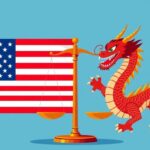Trump Proposes 50% Tariff on China in Retaliation to Rising Trade Tensions
President Trump proposed a 50% tariff on China if it does not revoke a planned 34% tariff on U.S. imports. The announcement has intensified trade tensions, raising fears of inflation and economic downturn. The situation continues to evolve as trade relations between the U.S. and China face significant strains.
President Trump announced a potential 50% tariff on Chinese imports, contingent upon China retracting its planned 34% retaliatory import fee on U.S. products. In a statement via his Truth Social app, he warned that any nation retaliating against the U.S. with additional tariffs will face significantly higher tariffs immediately.
Mr. Trump further specified that if China does not revoke its plan by April 8, 2025, the U.S. will proceed with the additional tariffs effective April 9. This announcement follows earlier tariff measures introduced by the President, aimed at addressing trade imbalances with numerous nations, including China and European Union countries.
In retaliation for Mr. Trump’s imposition of tariffs, Beijing declared a 34% tariff on U.S. imports, set to take effect on April 10. The ongoing trade conflict has caused concern on Wall Street, with economists suggesting that it may impede economic growth and lead to a recession.
Tariffs imposed are ultimately borne by U.S. importers, who are likely to transfer these costs to consumers in the form of increased prices. This situation raises fears of renewed inflation pressures in the coming year.
In summary, President Trump’s announcement of a potential 50% tariff on Chinese goods underscores escalating tensions in U.S.-China trade relations. If China does not withdraw its retaliatory tariff, substantial economic implications may arise, including increased consumer prices and economic instability. The situation warrants close observation as it unfolds.
Original Source: www.cbsnews.com








Post Comment